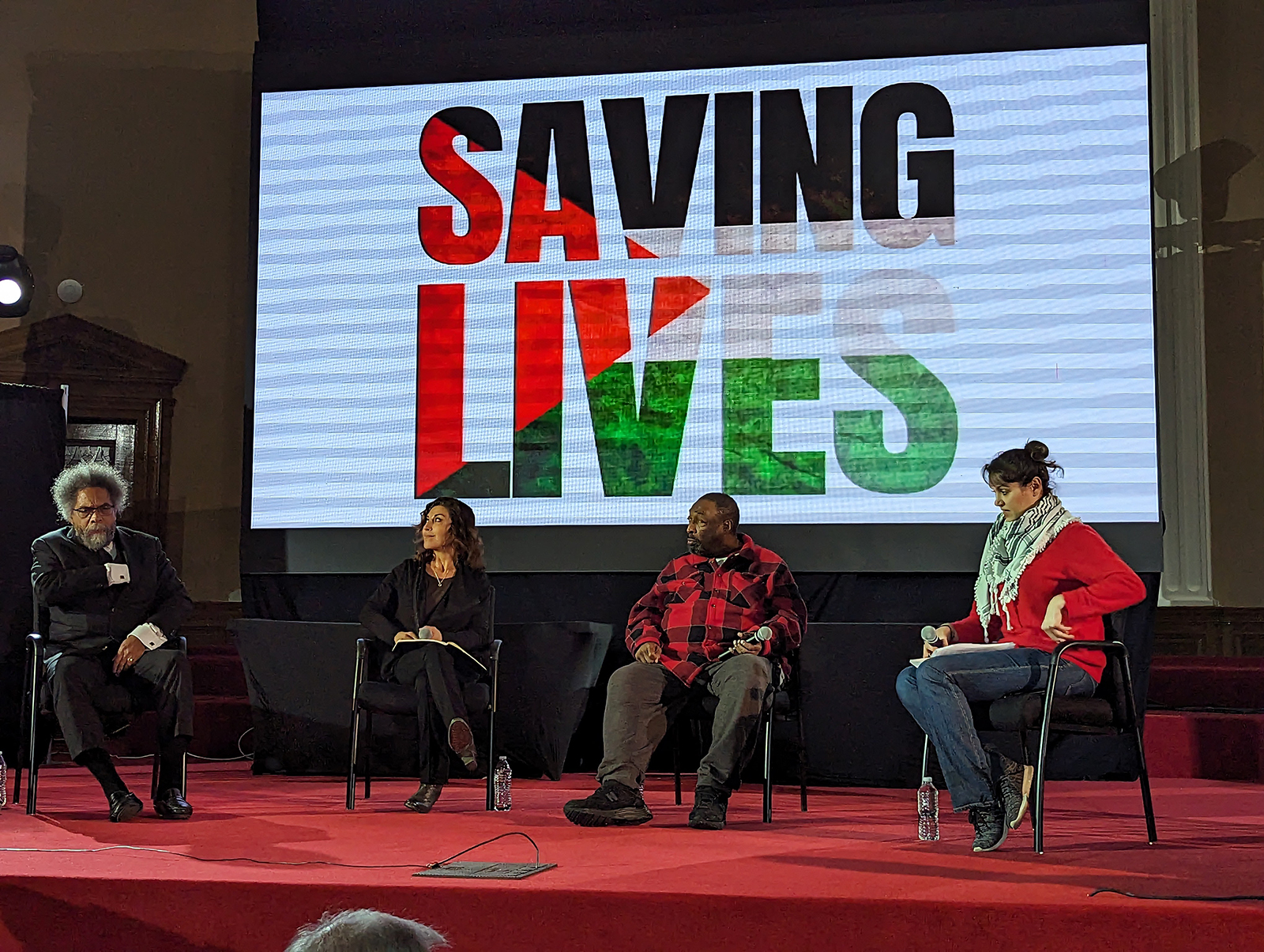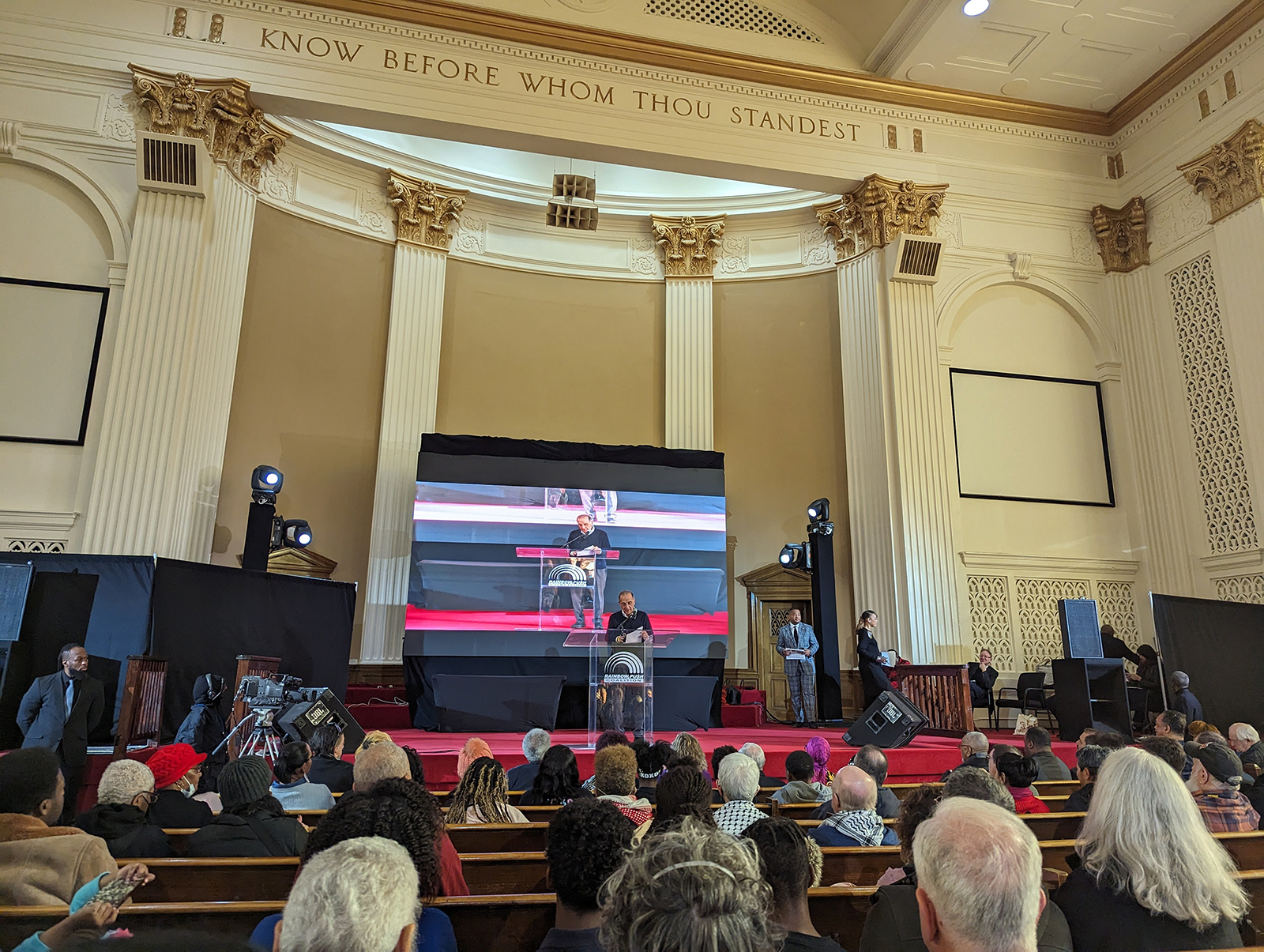
CHICAGO (RNS) — On Friday and Saturday (Jan. 12 and 13), nearly 2,000 faith leaders, politicians, activists and operatives — heirs of the Civil Rights Movement — convened for an Emergency Summit for Gaza hosted at the Rev. Jesse Jackson’s Rainbow PUSH Coalition in partnership with the Arab American Institute.
Jackson and his longtime friend and collaborator James Zogby, AAI founder, were both present in the role of senior leaders. The Rev. Frederick D. Haynes III, the current president of Rainbow PUSH Coalition, and Maya Berry, executive director at AAI, spoke and helped preside.
Leaders were joined by numerous dignitaries, including U.S. and state representatives and Chicago aldermen — U.S. Reps. Jonathan Jackson, Jesús “Chuy” Garcia and Cori Bush, and state Rep. Abdelnasser Rashid, among others. The countless kaffiyehs, traditional Palestinian scarves, being worn throughout the room highlighted the Palestinians and supporters of Palestinian rights.
The coalition that organized the summit, including Churches for Middle East Peace, where I am a fellow, is calling on the White House and Congress to advocate for a permanent cease-fire, the release of Israeli hostages and Palestinian prisoners being held without due process, comprehensive access for humanitarian aid to Gaza and the enforcement of conditions on U.S. funding to Israel that are already in U.S. law and applied to every other nation that receives U.S. military aid.
The summit highlighted the historic connections between the American Civil Rights Movement and the fight for Palestinian rights.

Panelists at the Emergency Summit for Gaza event at the Rainbow PUSH Coalition national headquarters in Chicago. (Photo courtesy of Ben Norquist)
Participants gathered in person and virtually to reaffirm the civil rights tenet that “injustice anywhere is a threat to justice everywhere,” a refrain reiterated by several speakers. In his “Letter from a Birmingham Jail,” the Rev. Martin Luther King Jr. used the phrase to insist that injustice in Birmingham, Alabama, was a threat to justice throughout the country. By the same token, the event website states that it is “our moral obligation” to stand against injustice in Gaza and called on Americans to advocate for an end to the violence and for root causes to be addressed.
A winter storm blasted Chicago on Friday, but organizers forged ahead. Hundreds of participants arrived through blizzard conditions, braving dangerous roads to be present as snow piled up and temperatures plunged.
Multiple organizations co-sponsored the summit, including Christian, Jewish, Muslim and secular groups. Haynes celebrated this diverse participation as an expression, in King’s words, of the “beloved community,” working across racial, religious and geographic lines for a shared vision of justice.
In the room were leaders of efforts to pass local resolutions across the country calling for cease-fire in Gaza; members of international human rights organizations documenting the violence and its effects in Gaza; and activists mobilizing constituencies to speak to their representatives.
The full program also included Cornel West, who holds the Dietrich Bonhoeffer Chair at Union Theological Seminary and is a presidential candidate; Nina Turner, former Ohio state senator and now a senior fellow at the New School Institute on Race, Power and Political Economy; Eva Borgwardt, national spokesperson for IfNotNow, a movement of American Jews seeking justice for Palestinians; John Dabeet, president of the U.S. Palestinian Council; and the Rev. Jamal Bryant, pastor at New Birth Missionary Baptist Church near Atlanta. Some of the speakers had a busy weekend, splitting their time between the summit, the March for Gaza in Washington, D.C., on Saturday and MLK Day observances.
This connection between the American Civil Rights Movement and Palestinian liberation can be seen at least as far back as the responses of some Black American groups to the 1967 war, when Israel first occupied the West Bank and Gaza. Groups such as the Student Nonviolent Coordinating Committee came to view the Palestinians as part of an international struggle against colonialism and racism.

James Zogby addresses the Emergency Summit for Gaza event at the Rainbow PUSH Coalition national headquarters in Chicago. (Photo courtesy of Ben Norquist)
This solidarity is embodied today in the relationship between Jesse Jackson and Zogby, a relationship that goes back to the mid-1970s when Jackson was among the first civil rights leaders to support Zogby’s new Palestine Human Rights Campaign. Other civil rights leaders also went on to offer their support, including many of those who had been close to King.
Zogby recalls that when Jackson asked him to serve in Jackson’s 1984 campaign for U.S. president, Zogby told him: “You’ll accomplish more in the next four months than you have in the last four years.”
“And it was true. I can’t tell you how energizing it was for Arab Americans to have someone running for president want to listen to them,” Zogby said.
These connections between the American Civil Rights Movement and the movement for Palestinian rights were celebrated throughout the summit, as references were made to proponents of racial justice in the United States — King, Frederick Douglass, Fannie Lou Hamer and James Baldwin — alongside Palestinian American writers such as Edward Said and Rashid Khalidi.
Senior leaders at the event, some of whom were part of the Civil Rights Movement of the ’60s and ’70s, appealed to the youth in the room. At one point, the “young people” were asked to stand up and be recognized. Dozens rose throughout the sanctuary. “The younger generation coming up in the movement are rediscovering their connections to Palestinian liberation,” said Zogby. “It’s been lost on some, but the roots were always there.”
Indeed, Jesse Jackson has been advocating for peace and justice for Israelis and Palestinians for decades over numerous trips to the Middle East, meetings with Middle East leaders and public statements. This event, featuring senior, present and future leadership, suggests that legacy is continuing.
The event took place surrounded by Jewish images adorning the stained glass panels and the plaster relief throughout the historic synagogue that serves as the headquarters for Rainbow PUSH Coalition. The building is in Kenwood, in a geography saturated with Black history and the fight for racial justice. Emmett Till’s house is minutes away, starkly resonating with the unfolding fate of children in Gaza.
The Civil Rights Movement’s lexicon was in ready use throughout the event. Jesse Jackson led the room in a call-and-response prayer from earlier days in the movement.
“I am somebody!”
“I am somebody,” came the response.
“I am a child of God!”
“I am a child of God,” the audience called back. They did not need prompting — they knew the words already. It was like that throughout the event.
This was a group that shared a common language developed over decades of working for civil rights in the United States and liberation for oppressed people around the world, behind the language a set of commitments now leading them to speak up and speak out for a cease-fire and justice for the Palestinians.
(Ben Norquist serves as the Ambassador Warren Clark Fellow at Churches for Middle East Peace, where he studies the shrinking space for civil and human rights activities in Israel. He is also working on a book about how American Christians engage with land and place, due in 2025. The views expressed in this commentary do not necessarily reflect those of Religion News Service.)
